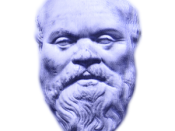Plato's arguments for the distinct existence of the soul are presented best in the Phaedo where Plato voices his opinions through a recital of Socrates "ÃÂdeath bed' philosophies to present the case that the soul is immortal.
The link between the argument for the immortal soul and the dualist view of the soul is rudimentary; without belief in one the other cannot be justified, as any other type of soul could not survive the bodies death.
The first argument Plato presents can be labelled the argument from opposites. Socrates starts the argument by stating that "all things which come to be and which have an opposite must necessarily come to be from their opposite and nowhere else"� or more simply put as opposites are generated by their opposites. He furthers the argument by logically applying it concluding that life must generate death. In this line of arguing then it is fair to say, as Socrates does, that if the soul dies it must at some point resurrect and therein starts the cycle of an immortal soul.
This has relevance to the view of the soul as distinct in that within this model the soul continues to cycle independently of the body.
The second argument commonly marked as the argument from recollection, moves to suggest that the soul must have pre-existed ourselves because we carry knowledge which does not originate from experienced learning but rather from recollection i.e. a previous knowledge gained of ideas. This is an allusion to Plato's theory of forms, which suggests that we all recognise concepts such as equality because we all have knowledge of absolute equality or as Plato called it "the perfect form of equality"�. Returning to the Phaedo Socrates sums up the argument from recollection like this. Firstly knowledge [of equality] cannot be...


